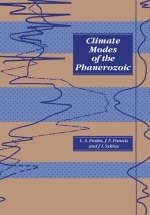
Climate Modes of the Phanerozoic
Seiten
2005
Cambridge University Press (Verlag)
978-0-521-02194-4 (ISBN)
Cambridge University Press (Verlag)
978-0-521-02194-4 (ISBN)
The evolution of the Earth's climate throughout the past 600 million years is examined by assessing the information on the warm and cold states of the Earth's past climates. The studies in this 1992 book will help determine the major mechanisms of climate change on a geological time scale.
The changes in the Earth's climate over the past 600 million years, from the Cambrian to the Quaternary, come under scrutiny in this book, first published in 1992. The geological evidence for ancient climates is examined, such as the distribution of climate-sensitive sediments. The Earth's climate has changed many times throughout the Phanerozoic. Thus in this book the climate history has been divided into Warm and Cool modes, intervals when either the Earth was in a former 'greenhouse' state with higher levels of atmospheric CO2 and polar regions free of ice, or the global climate was cooler and ice was present in high latitudes. The studies presented here highlight the complex interactions between the carbon cycle, continental distribution, tectonics, sea level variation, ocean circulation and temperature change as well as other parameters. In particular, the potential of the carbon isotope records as an important signal of the past climates of the Earth is explored. This book will be useful to all students and researchers with an interest in palaeoclimates and palaeoenvironments.
The changes in the Earth's climate over the past 600 million years, from the Cambrian to the Quaternary, come under scrutiny in this book, first published in 1992. The geological evidence for ancient climates is examined, such as the distribution of climate-sensitive sediments. The Earth's climate has changed many times throughout the Phanerozoic. Thus in this book the climate history has been divided into Warm and Cool modes, intervals when either the Earth was in a former 'greenhouse' state with higher levels of atmospheric CO2 and polar regions free of ice, or the global climate was cooler and ice was present in high latitudes. The studies presented here highlight the complex interactions between the carbon cycle, continental distribution, tectonics, sea level variation, ocean circulation and temperature change as well as other parameters. In particular, the potential of the carbon isotope records as an important signal of the past climates of the Earth is explored. This book will be useful to all students and researchers with an interest in palaeoclimates and palaeoenvironments.
Preface; Introduction; 1. The early Cambrian to late Ordovician warm mode; 2. The late Ordovician to early Silurian cool mode; 3. The late Silurian to early Carboniferous warm mode; 4. The early Carboniferous to late Permian cool mode; 5. The late Permian to middle Jurassic warm mode; 6. The middle Jurassic to early Cretaceous cool mode; 7. The late Cretaceous to early Tertiary warm mode; 8. The Cenozoic cool mode: early Eocene - late Miocene; 9. The Cenozoic cool mode: late Miocene - Holocene; 10. Causes and chronology of climate change; Bibliography; Index.
| Erscheint lt. Verlag | 3.11.2005 |
|---|---|
| Zusatzinfo | 50 Line drawings, unspecified |
| Verlagsort | Cambridge |
| Sprache | englisch |
| Maße | 170 x 244 mm |
| Gewicht | 462 g |
| Themenwelt | Naturwissenschaften ► Biologie ► Evolution |
| Naturwissenschaften ► Geowissenschaften ► Meteorologie / Klimatologie | |
| Naturwissenschaften ► Geowissenschaften ► Mineralogie / Paläontologie | |
| ISBN-10 | 0-521-02194-4 / 0521021944 |
| ISBN-13 | 978-0-521-02194-4 / 9780521021944 |
| Zustand | Neuware |
| Haben Sie eine Frage zum Produkt? |
Mehr entdecken
aus dem Bereich
aus dem Bereich
Wie die Vernichtung der Arten unser Überleben bedroht - Der …
Buch | Softcover (2023)
Penguin (Verlag)
15,00 €


